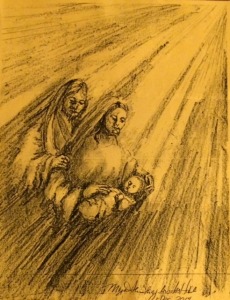Readings: Luke 1:46b-55; I Samuel 2:1-10; Mark 11:1-11
And Mary said, “My soul magnifies the Lord, and my spirit rejoices in God my Savior, for he has looked with favor on the lowliness of his servant. Surely, from now on all generations will call me blessed; for the Mighty One has done great things for me, and holy is his name. His mercy is for those who fear him from generation to generation. He has shown strength with his arm; he has scattered the proud in the thoughts of their hearts. He has brought down the powerful from their thrones, and lifted up the lowly; he has filled the hungry with good things, and sent the rich away empty. He has helped his servant Israel, in remembrance of his mercy, according to the promises he made to our ancestors, to Abraham and to his descendants forever.” [Luke 1:46b-55, NRSV]
It is a time of waiting. It seems to have been a time of waiting for a long time. Waiting for the ravages of the pandemic to cease. Waiting to be with people we know and love. Waiting to hug our grandchildren not just have a virtual chat with them. Waiting to let go of the fear. We wait for something to change, for things to get better.
When the waiting has gone on as long as this waiting has, it’s hard to hold on to hope. I think it was hard for Mary, too. She and other Jews had been waiting for the Messiah for a long time. So, to keep holding on to hope, Mary remembered. She remembered all that had happened, all that God has done. And in that remembering hope blossomed. And when hoped blossomed she was ready. Ready to join in the work of God.
It sometimes helps to sing our remembering. If that’s true for you, here’s a hymn that might help:
A Song of Praise (Tune: Hyfrydol, “Come Thou Long Expected Jesus”)
Now I lift my song of praises, God my soul does magnify.
Now I sing in great rejoicing, to God’s blessings testify.
For our God has looked with favor on the servant meek and low.
From now on all generations, blessing, honor will bestow.
God has shown great strength and power, brought the proud and might down,
Lifted up the lowly people as a sign that love abounds.
God has given to the hungry good things that they may be filled.
And the rich have been made empty, sent away their voices stilled.
Holy is God’s name forever, for our God has done great things.
Mercy comes to all who fear God, those who live the praise they sing.
God has helped the faithful servant, showing mercy, justice, love.
So forever we will serve God, lift our song of praise above.
May the faith we share together be a faith like Mary’s own.
May the life we live together prove our trust in God alone.
God of challenge and disruption, God whose ways our own confound,
May we celebrate and follow when the world’s turned upside down.
Offered by Jeff Jones, writer bound for Bethlehem.



